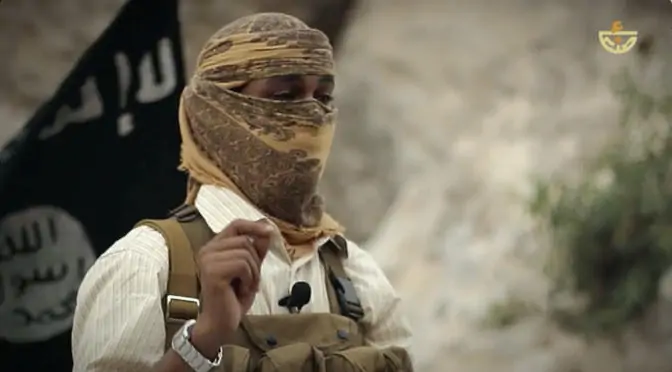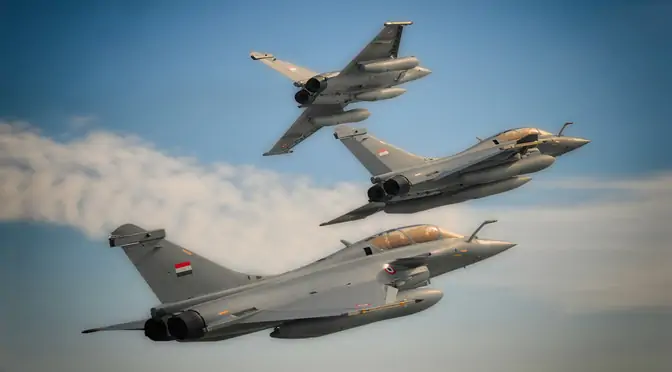This article is the sixth of our series focusing on scenarios depicting interventions in the Libyan war. In our previous article, we discussed the preliminary stages of an international coalition created to intervene in Libya in favor of the nationalists – either by invitation from the nationalist government, or if the new unity government fails and fragments. However, Libya’s new Government of National Accord (GNA) is now recognized by the U.S., UK, Italy, Germany and France as “the only legitimate government in Libya” (European Union Statement, March 13, 2016; Musa, Boston Globe, March 13, 2016), which means that any international intervention that favors the nationalist side will now occur only after (and if) this unity government fragments into former factions. …
Category Archives: War
An Updated Guide to the Islamic State Psyops
last update: selected 10 videos… updated dates for all the latest issue of magazines, Amaq in Bengali, al-Bayan in Bengali. The defeated attack by the Islamic State on Ben Guerdane in Tunisia on 7 March 2016 probably indicated a worrying shift in tactics and strategy, which must be considered (e.g. Vanessa Szakal, “Mainstream Media on Ben Guerdane: victory and foreboding in Tunisia“, Nawaa, 11 March 2016). This attack may be seen as having been heralded by a significant call made by the Islamic State to the Islamic Maghreb through five psyops videos published over two days (19-20 January 2016). In parallel, Al-Qaeda in the Islamic Maghreb started to copycat the Islamic State’s type of videos (Andrea Spada, “Al-Qaeda tries to imitate Daesh in new threatening …
Continue reading “An Updated Guide to the Islamic State Psyops”
Scenarios for the Future of Libya – Sc 2 (5) International Intervention
This article is the fifth of our series focusing on scenarios depicting interventions in the Libyan war. In our previous article, we discussed a Qatari intervention in Libya on the Islamist side. Here, we shall detail scenarios for an international intervention in Libya from beyond the region, which could occur if the nationalists and their internationally recognized government (at least until power is officially transferred to a unity government) extend an invitation to external actors, or if the unity government fails entirely. The unity government could fail if rival Libyan politicians are unable to form a unity government at all, or if the unity government is formed, but fails to make progress and thus disintegrates into former factions. If we …
Continue reading “Scenarios for the Future of Libya – Sc 2 (5) International Intervention”
Understanding the Islamic State’s System – Wilayat and Wali in Yemen
When we started our series to better understand the Islamic State system, we identified the wilayat (“what is taken charge of”, “what is ruled”) as unit of analysis and as a system, which can then be monitored to foresee and warn about the overall developments of the Islamic State (see Understanding the Islamic State’s System – Structure and Wilayat, 4 May 2015). Since then, evolution has taken place on the ground, while the body of knowledge gathered by students of the Islamic State has grown. This is notably the case for Yemen. Back in May 2015, our understanding, grounded in the evidence available then, was that there was one wilayat in Yemen, wilayat Sanaa, loosely categorised as part of those wilayat where fighting was preeminent and only extremely …
Continue reading “Understanding the Islamic State’s System – Wilayat and Wali in Yemen”
Scenarios for the Future of Libya – Sc 2 (4) Qatar Intervenes on the Islamist Side
This article is the fourth of our series focusing on scenarios depicting interventions in the Libyan war. In our previous article, we discussed an Egyptian intervention in Libya on the nationalist side. In this article, we shall detail a Qatari intervention on the side of the Islamists, as well as possible scenario outcomes for an intensified, protracted conflict that results from either an Egyptian or Qatari intervention. At this stage for our scenarios, external actors have decided to militarily intervene in Libya by taking a side with either the Islamists or nationalists that could emerge from a renewed split in the Government of National Accord (see previous article). Considering the future names of potential factions that would result from a new split …
At War against a Global Islamic State – The Fall into Extreme Sunni-Shi’ite Tensions
In this series, which emphasises some of the major strategic dangers related to the war against the Islamic State, we focused first on geographical risks resulting potentially from a narrow understanding of the Islamic State’s implantation and outreach. We thus moved from a Mesopotamian theatre of war to a regional one (“From Syria to the Region“), then to the necessity to also incorporate all global operations of the Islamic State in the strategy, explaining how operations in one area could impact operations elsewhere as well as the overall war (“A Global Theatre of War“). We notably took as examples, beyond the obvious case of Libya, Somalia (“Facing a Strategic Trap in Somalia?“), Bangladesh, the Philippines, Malaysia and Indonesia (“From the Philippines and Indonesia to Bangladesh“). The strategic challenges presented …
Scenarios for the Future of Libya – Sc 2 (3) Egypt Intervenes on the Nationalist Side
Recently, announcements have been made regarding the acceptance of a UN-facilitated peace agreement with a framework to form a Government of National Accord (UN News Centre, January 2, 2016). However, only 88 lawmakers from the rival governments were in attendance at the signing, while the Deputy Speaker of the GNC stated on January 2nd that the GNC rejects the agreement, and the attending lawmakers represented “only themselves” – signifying difficulties and confusion regarding a fully-endorsed agreement by both sides (Abbas, Albawaba News, January 2, 2016; DePetris, Quartz, January 1, 2016). Furthermore, although the peace deal is supported by the international community and the UN has promised to support Libya in its transition (Ibid; Narayan and Robertson, CNN, December 17, 2015), …
At War against a Global Islamic State – from the Philippines and Indonesia to Bangladesh
As the noose seems to be slowly tightening around the Islamic State in Mesopotamia, it is even more important to consider the global dimension of the Khilafah. It is indeed likely that all geographical components will be used by the Islamic State in its will to counter-attack and survive. A strong indication confirming the global …
Scenarios for the Future of Libya – Scenario 2 (2) – The Joint Arab Force Intervenes
This article is the second of our series focusing on scenarios depicting interventions in the Libyan war. As detailed previously we have reached the following stage in our sub-scenarios: External actors have decided to militarily intervene in Libya by taking a side with either the GNC or COR (Sc 2.1.1). The League of Arab States (LAS) meets to decide about an intervention in Libya and to form the related Joint Arab Force. Considering the position of each country, the debates are very animated to say the least (Sc 2.1.1.1). As a result, the Arab League internally fragments over the decision to intervene. Nonetheless a Joint Arab Force is formed involving three countries, Egypt, the UAE, and Jordan. It is about …
At War against a Global Islamic State – Facing a Strategic Trap in Somalia?
The Islamic State’s actions are continuing globally, unfortunately illustrating the points made previously in “A Global Theatre of War” (23 Nov 2015), with the San Bernardino attacks in the U.S. on 2 December 2015 (BBC News, 7 Dec 2015) and the stabbing of three people in the tube station in London on 5 December 2015 (e.g. The Telegraph, 7 dec 2015). Meanwhile, and despite setbacks in Mesopotamia where the Islamic State is besieged in Ramadi, where it lost Sinjar to the Kurds and Yazidis, but immediately reopened a new route between Mosul and Raqqa, the Khilafah continues its strategy to call to new people, for example with the publication of a first Nasheed in Mandarin likely aimed at the Hui, Chinese Muslims, however unlikely the Hui as a group may …
Continue reading “At War against a Global Islamic State – Facing a Strategic Trap in Somalia?”











